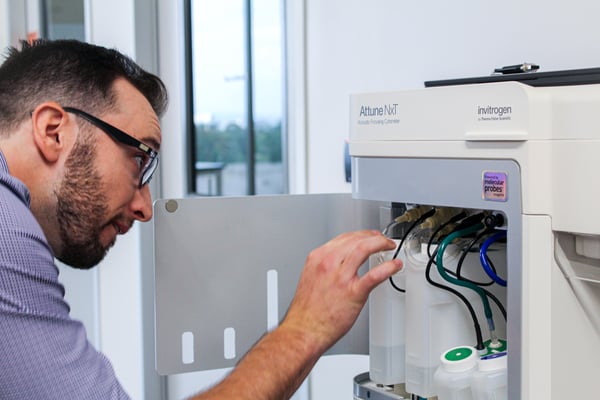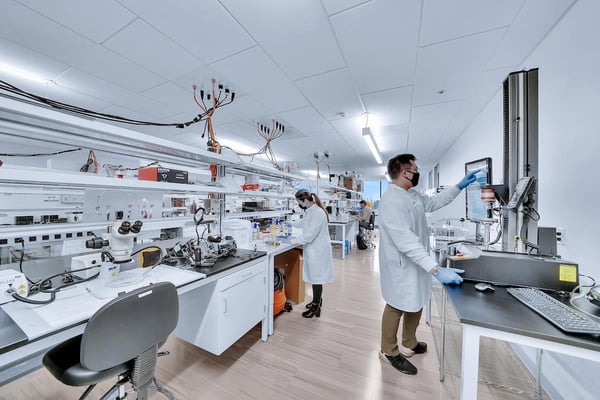Lab space is an essential resource for startup biotech companies.
There are many factors that go into choosing, building, equipping, and managing lab space, whether in an incubator or an independent facility. For many biotech startup founders, their experience with lab space is limited to academic environments, which have different incentives for arranging and running their space than young biotech companies do. Therefore, it’s common for biotech startups to begin learning about startup lab space while they shop around for it, which is less than ideal.
By understanding the different aspects of lab space, biotech startup founders can make better decisions for their companies. These aspects include:

One of the most important resources for early-stage life science companies is access to lab space. Biotech startups frequently need to reach proof of concept before they can raise enough funding to build their own laboratory, but they need a lab in order to reach proof of concept. This problem even affects startups coming out of academic labs because if they create intellectual property using on-campus lab space, the university legally owns it, not the startup.
Luckily, wet lab incubators have become more common in the past decade. Wet lab incubators provide small amounts of laboratory space to life sciences startups, allowing them to reach proof of concept without spending all their money. Wet lab incubators are different from traditional “business incubators” because the primary resource they provide is the laboratory space itself, rather than a program for new entrepreneurs.
🔬Related: What is a Wet Lab Incubator?
Business incubators can also be useful for life sciences startups to learn about business topics like incorporation, how to pitch, and best practices for hiring, but they don’t offer space where biotech startups can make progress on their technology. Wet lab incubators, on the other hand, provide lab benches, private lab suites, shared equipment, and services, plus addressing some of the same topics that business incubators do, but specifically for life sciences startups.
Many wet lab incubators function similarly. It’s common for new members to undergo an onboarding process in which they learn about the incubator’s policies and procedures. Day-to-day life at the incubator might include participating in events, scheduling time on high-use equipment, and discussing a problem with a neighboring company to see if they have any insights. The community aspect of incubators is a big plus for many startups, though some drawbacks are to be expected. Even the best incubator will experience equipment failures from time to time, and sometimes a piece of equipment won’t be available when you want it. But for most young biotech companies, incubators provide many more pros than cons.
🔬Related: What is Life Like at a Wet Lab Incubator?
Another common factor across incubators is that most have an application process. For some it is a competitive application for limited space, for others it’s a chance to see whether a new company will fit into the community, and still others evaluate prospective members for their likelihood to succeed. For a biotech startup that is applying to incubators, knowing what to expect can help. Most incubators are interested in making sure that the companies they accept will find what they need in terms of infrastructure and support. They want to know that the scientists are well trained and understand the need for safety protocols.
Applying to an incubator is also a chance to make sure the space is a good fit for you and your company. Startup biotech companies may be content to work in a space that was not designed specifically for their own workflows, but aspects like equipment availability, safety, and security should not be compromised on. Preparing a list of questions ahead of time to ask while touring the space can be a great way to make sure all of your requirements are met.
🔬Related: What to Expect When Applying to a Wet Lab Incubator
In a place like Southern California where there are many different high quality wet lab incubators to choose from, the issue might be less about which incubator will accept you but rather which one do you prefer. Every startup will have different service preferences, brands of equipment they’d rather use, and networks they’d like to be part of. These factors, plus location, selection of shared equipment, reputation, and on-site staff are all important for biotech startups to consider before choosing an incubator. Some incubators can provide better introductions to venture capital firms, whereas others will be located conveniently for your head scientist. It is up to each startup to decide what is the most important for their company’s success.
Although wet lab incubators can and do save life sciences startups a lot of money, they are not free. The prices that incubators charge vary depending on the location, the equipment they provide, the services that are covered, and the level of support that on-site staff give to member companies. If prices for incubator space are broken down into per-square-foot terms, they can seem high, but that does not accurately represent all of the amenities that these spaces provide. The shared space, events, and introductions that startups find in incubators are not captured by these prices. Plus, incubators allow life sciences startups to predict their monthly operating costs by charging flat rates. In a highly uncertain industry like life sciences, some predictability can be very helpful.
Independent lab space is a different story. It can easily cost millions of dollars for a young life sciences company to renovate existing commercial space into a laboratory, and already built-out labs are in high demand. There are many reasons why lab space is expensive, including utilities, specialized furnishings, and ongoing operating costs. In addition, outside of wet lab incubators, life sciences companies have to purchase and maintain their own lab equipment.
Some factors that drive up the cost of lab space can be altered with efficient design, but understanding the necessary expenses can help startup biotech companies to understand when they are truly getting a good deal, versus missing out on needed amenities and services.
🔬Related: 11 Reasons Why Lab Space is so Expensive

Laboratory equipment tends to be expensive. A single biotech company can easily need access to millions of dollars worth of equipment even at an early stage. Luckily, incubators usually provide most of the equipment that life sciences startups regularly use. However, startups may need their own equipment for various reasons even before they have their own lab space. In buying lab equipment, companies have many options. The most basic is whether to buy new or used equipment. For an early-stage startup doing research and development, used equipment can be a great option. For growth-stage companies or those who are preparing for clinical trials, new equipment might be necessary in order to fulfill regulatory requirements.
Used equipment might seem like a risk for startup founders who want to avoid having equipment failures and down time. However, just because an item is new, that does not mean it won’t break. The benefit of buying new equipment is that there will be a longer warranty period, so if it breaks the company will fix it or replace it. Used equipment, on the other hand, usually has a very short warranty, if any. However, some pieces of equipment are fantastic to buy used. Some older pieces of equipment were built to last for decades, whereas modern versions were built to be replaced, similar to the cycle we see with computers and cell phones.
Maintaining lab equipment and performing preventive maintenance on schedule helps to prevent unexpected failures. Biotech startups might avoid purchasing preventive maintenance contracts in the hopes of saving money, but if a piece of equipment is essential to the lab’s function, its maintenance is also essential.
Whether buying new or used, biotech startups want to get the best deal possible. Make sure to contact your local industry organization like Biocom or CLSA to learn how they can help biotech startups save money through purchasing programs.
🔬Related: Buying New Lab Equipment

As mentioned above, at some point most companies will have to move out of their biotech incubator, whether because they have grown too large, require more space than is available, or have stayed for the maximum amount of time allowed. The process of finding and building out independent laboratory space can be challenging, but a solid understanding of the drivers of expenses in labs can help biotech companies avoid paying too much.
For many, the challenge is in simply locating a building or suite for lease. Brokers can help, but it can be difficult to find one who has experience with lab space. Without such experience, you as the client have to provide specific information on what you require in a building to make it suitable for lab space.
So, how do you know if a building is suitable for a lab? There are many factors to consider, but the most important ones include: zoning, electrical, HVAC (heating, ventilation, and air conditioning), and zoning. With enough investment into the space, all of these can be altered (except, perhaps, zoning), but finding a building with sufficient airflow, electricity, drainage, and that is in a zone that permits labs, makes the whole process much quicker and simpler.
🔬Related: How to Find Laboratory Space for Biotechnology Companies
Download The Ultimate Guide to Wet Lab Incubators in Southern California, a handbook to assist life science start-ups through the entire decision-making process to find wet lab space.
Download Now